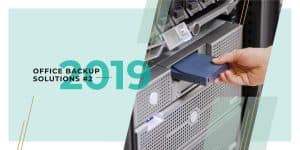A Halloween Horror Story
Few topics sound as boring as office backup solutions.
Until you hear what happens when you lack one.
Some months ago, a big industrial company called us out of the blue. They’d heard of us from one of their business partners, who is our client, and hoped we could help.
See, they were in a bit of a bind: their current IT had set up a remote access system so he could maintain the server from home. All good, except that he used a rather unsecured protocol, on the default port (easily scanned by hacker robots), with a weak password.
As a result, the server got hit by one of those ransomware viruses. Ransomware are tricky little things that encrypt all your files, then ask money to decrypt them.
Essentially, they had just lost all the data on their server.

Our first reaction was to say, “Sure, we’ll secure the access, restore your backups, and you’ll be on your way!”
That’s where things got a little tense.
- Did they have backups? Yes.
- Were the backups stored externally? No.
- Huh oh… Were the backups stored on the server? Yes.
- Errr…. Were the backups encrypted too? Well… Yes.
Ouch.
– That client
Long story short: it took them weeks to get back on their feet, getting old backups from their previous server that they fortunately kept around, and recreating most of what was missing.
No need to say that the total cost just in terms of lost productivity was staggering, compared to investing in any of the available data protection solutions.
The fact is, most CxO have a very faint idea of how their company’s backups are working, let alone how to define a proper backup policy.
Our goal is to bring a bit of clarity in this crucial part of your business.
Data, what data?
Let’s face it: we’re drowning in data. E-mails, documents (who doesn’t love another PowerPoint?), sales results, contact lists, photos, you name it.
All that data, in its diverse forms, lies around in our computers, phones, servers or in the cloud.
If it suddenly goes missing, it can grind our operations to a halt.
Think about it. What runs your business day in and day out? Chances are, all aspects of your operations rely on data. Clients, suppliers, inventory, legal and taxes, HR, everything exists as a file or a database somewhere, that you need to access at some point.
Now ask yourself, do you know exactly what office backup solutions are protecting you, and how?
Murphy’s law
If something can go wrong, it will. Including for your precious files. Hardware breaks. Virus wreak havoc on servers. Laptops and phones get stolen.
Anything can and will happen, which will wipe an enormous amount of data in the blink of an eye.
It’s not a matter of “if”, it’s a matter of “when”.

This can have serious consequences.
- 93% of companies that lost their data center for 10 days or more during a disaster, filed for bankruptcy within one year of the disaster (National Archives & Records Administration in Washington)
- Of companies that suffer catastrophic data loss: 43% never reopen and 51% close within two years (University of Texas)
- 30% of all businesses that have a major fire go out of business within a year and 70% fail within five years (Boston Computing Network, Data Loss Statistics)
- The average cost of downtime per hour is $25,000 to $50,000+ (Advertorial Infographic: Why Disaster Recovery in the Cloud Should Be in Your Plans, International Data Group, 2015)
- Companies with 100 – 2,000 employees are likely to experience costs over $20,000 in the event of a disaster (The 2015 Disaster Recovery & Business Continuity Survey)
The source of these numbers is not always clear, and has been a subject of debate. Without proper office backup solutions, data loss can heavily impact your business.
Be Prepared: office backup solutions
So yes, life happens. Things break. That doesn’t mean you’re doomed just yet. Many office backup solutions are on the market that help you make sure that when push come to shove, you keep your business data safe.
In this series of articles, we will review the different data storage supports and strategies, each with their advantages and their inconvenient.
- Tape backups
- External disk
- NAS
- Automatic Cloud backup
We’ll also review backup strategies, data retention policies, self vs managed restoration, Disaster Recovery vs Business Continuity, etc.
Stay with us for the next few weeks to learn everything you need to know about office backup solutions!


